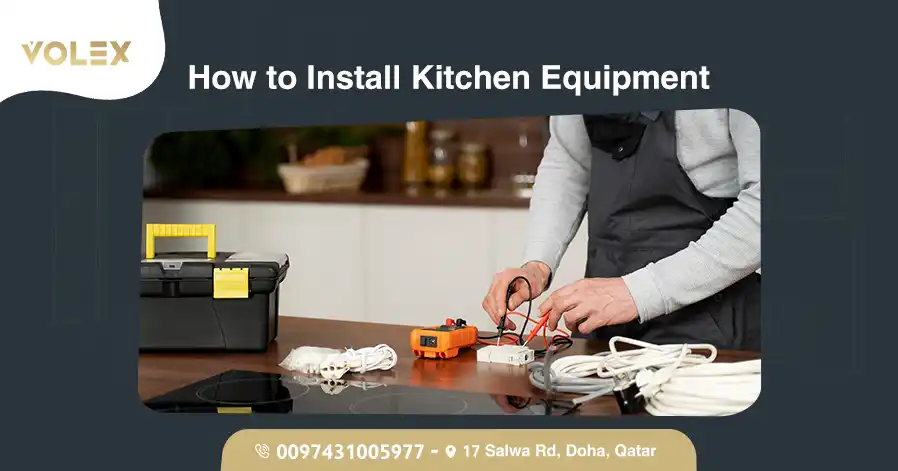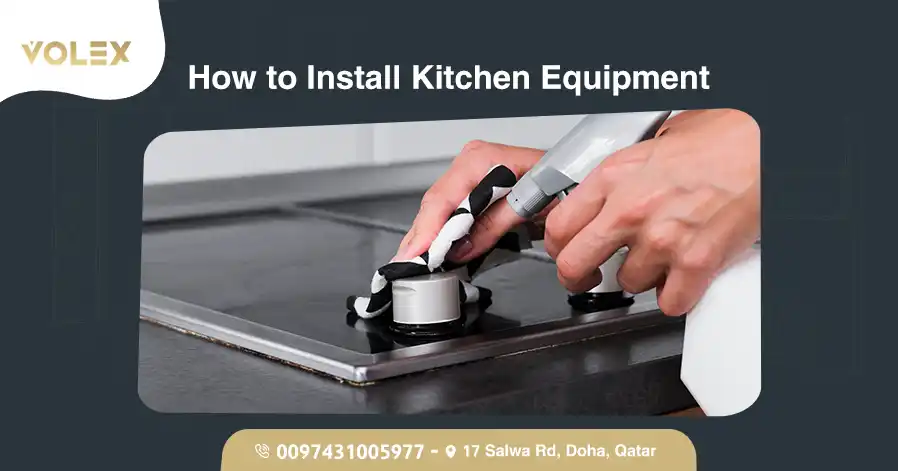Whether you’re building a commercial kitchen for a restaurant or upgrading your home setup, knowing how to install kitchen equipment properly is essential for efficiency, safety, and long-term performance. A well-installed kitchen is not just about function—it reflects taste, planning, and design sophistication, much like the custom-built precision kitchens delivered by Volex Trading.
This article walks you through the different types of kitchen equipment, detailed installation requirements, and the best kitchen equipment company in Qatar for a hassle-free experience. If you’ve ever wondered how to install kitchen equipment like a pro, you’re in the right place.
Types of Kitchen Equipment
Before beginning the installation process, it’s important to identify the different types of kitchen equipment and how their characteristics influence layout and installation needs.
Need help installing specialty appliances? Contact Volex today via Instagram or WhatsApp to get expert support tailored to your kitchen setup.
1- Commercial vs. Residential Equipment
Commercial equipment: is made for heavy-duty, high-volume cooking, often seen in hotels, restaurants, and catering businesses. These units are larger, more powerful, and typically require reinforced flooring, special ventilation, and higher utility loads. This is especially important when planning how to install kitchen equipment in high-performance spaces.
Residential equipment: is designed for everyday use in modern homes. Though less intensive, it still requires thoughtful integration—especially in contemporary kitchens where function meets design. In these settings, brands like Volex Trading bring a seamless blend of performance and visual harmony that elevates the entire kitchen environment.
Explore all your needs about Residential Kitchens
2- Essential Kitchen Appliances
These core items are common in every kitchen setup and must be addressed during any plan on how to install kitchen equipment:
- Cooking ranges and ovens
- Refrigerators and freezers
- Dishwashers
- Microwave ovens
- Kitchen hoods and exhaust fans
Correct installation ensures these appliances work safely and at peak performance.
3- Specialty Equipment
High-performance or niche appliances include:
- Combi ovens
- Blast chillers
- Steamers
- Griddles
- Built-in espresso machines
When setting up kitchen equipment, specialty appliances typically require advanced techniques, customized cabinetry, and accurately planned utility connections.
Don’t miss to know more about General maintenance from volex

How to Install Kitchen Equipment
Mastering the setup of kitchen equipment starts with a clear plan, the right tools, and expert guidance. A successful kitchen isn’t just about connecting appliances—it’s a precise process that blends design, engineering, and attention to detail. These are the same standards that define Volex Trading’s approach to delivering outstanding kitchen installations
In the following points, we outline the professional steps for installing kitchen equipment.
Planning the Kitchen Layout
The first step in planning a kitchen layout is to ensure it is smart and efficient. Key considerations include:
- Workflow zones: Clearly define areas for preparation, cooking, cleaning, and storage to streamline tasks.
- Safe spacing: Allow adequate space for comfortable movement and safe operation of appliances.
- Visual harmony: Maintain consistency in design between appliances, countertops, and cabinetry to achieve a cohesive look.
A well-planned layout ensures you don’t just install equipment—you integrate it into a space that supports speed and safety.
Discover more about Ice Cream Machines from volex
Electrical Requirements
One of the key technical aspects of kitchen equipment installation is managing energy needs, as follows:
- Voltage requirements (110V, 220V, 380V)
- Dedicated circuits and breaker panels
- GFCI outlets near water sources
- Surge protection for electronics
Hiring a licensed electrician guarantees code compliance and long-term safety.
Plumbing Considerations
Proper kitchen setup also requires ensuring that water supply and drainage are correctly managed:
- Hot and cold water inlets
- Drain systems with grease traps
- Backflow prevention
- Water filters to protect machines
Ignoring plumbing can shorten equipment life and risk flooding or contamination.
Gas Line Installation
Gas appliances are a common feature in both residential and commercial kitchens. A proper setup involves:
- Installing secure gas lines
- Fitting shut-off valves and regulators
- Conducting leak tests
- Ensuring fire safety compliance
Gas installations should always be handled by certified professionals.
Ventilation Systems
Ventilation is an essential—yet often overlooked—aspect of a successful kitchen setup. A well-ventilated kitchen prevents smoke buildup, heat accumulation, and health code violations:
- Properly rated hoods (CFM)
- Make-up air systems
- Grease filters and fire suppression systems
- Ductwork that meets local regulations
All you need to know about hoods

Best Company in Qatar for Installation of Kitchen Equipment
If you’re looking to set up kitchen equipment in Qatar with expert support, Volex Trading Company is your ideal partner. Since 2011, the company has been a trusted name in delivering custom stainless steel kitchen solutions tailored to every need.
Why Volex?
- Tailored solutions for hotels, restaurants, and homes
- Design-to-installation turnkey service
- Experienced team, high-end materials
- Long-term support and maintenance
Mastering how to install kitchen equipment isn’t just about connecting wires and pipes. It’s about creating a kitchen that works seamlessly, with every detail carefully executed. With the right layout, utilities, and professional support—especially from companies like Volex Trading—your kitchen can reflect not just quality, but excellence.
When done right, your kitchen becomes more than a workspace—it becomes a space of intelligent design, reliability, and lasting performance.
Discover Best kitchen equipment design in Qatar
kitchen equipment company in Qatar
Finally, if you’re seeking a reliable and professional service, Volex is the kitchen equipment company in Qatar to trust. Known for its high-quality standards and meticulous attention to detail, Volex delivers outstanding kitchen installation solutions tailored to your needs.
You can now contact Volex, the trusted kitchen equipment company in Qatar, to benefit from high-quality services and competitive prices—reach out via Instagram or WhatsApp and get started today.
Let Volex bring your dream kitchen to life from design to installation, with unmatched quality and professionalism.
FAQs about How to Install Kitchen Equipment
What are the steps for equipment installation?
To fully grasp how to install kitchen equipment, follow these key steps: 1- Layout planning 2- Utility mapping (electric, gas, plumbing) 3- Equipment positioning 4- Hookup and connection 5- Testing and calibration 6- Final inspection
What is the arrangement of the kitchen equipment?
The optimal layout when learning how to install kitchen equipment involves placing appliances according to workflow efficiency: 1- Storage > Preparation > Cooking > Cleaning 2- Maintain triangle flow in residential kitchens 3- Zoning in commercial setups to separate tasks


